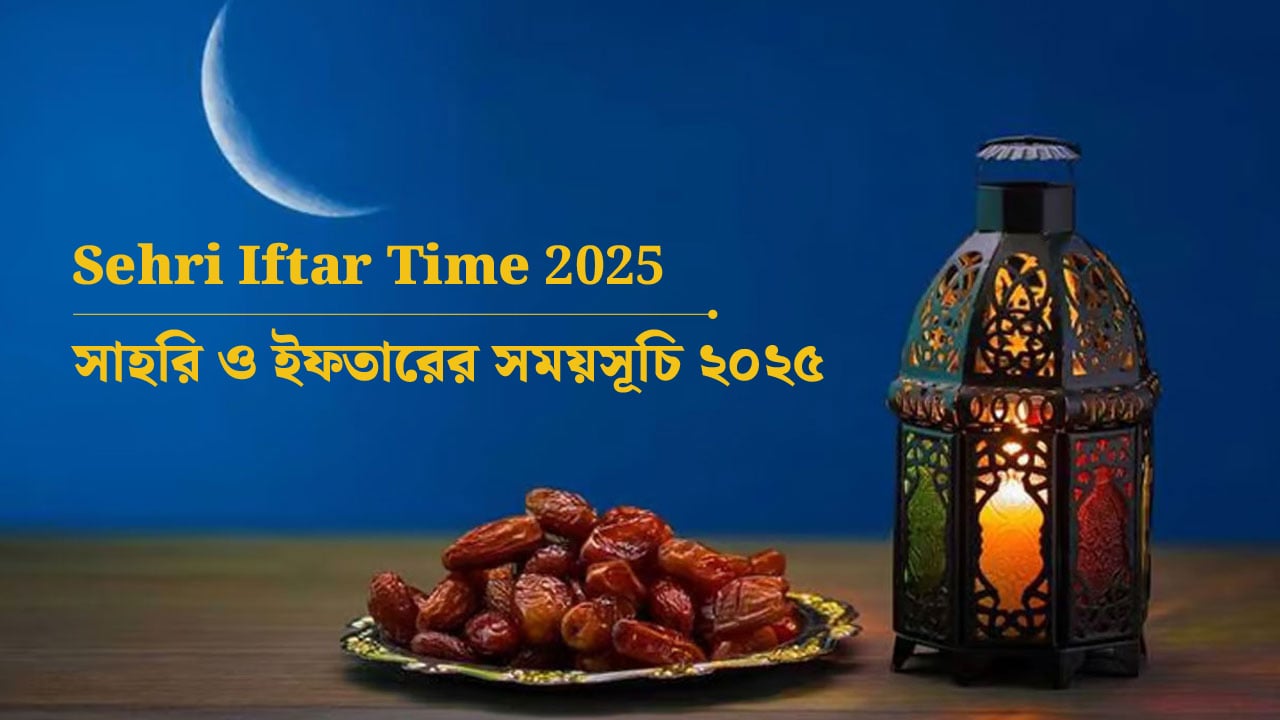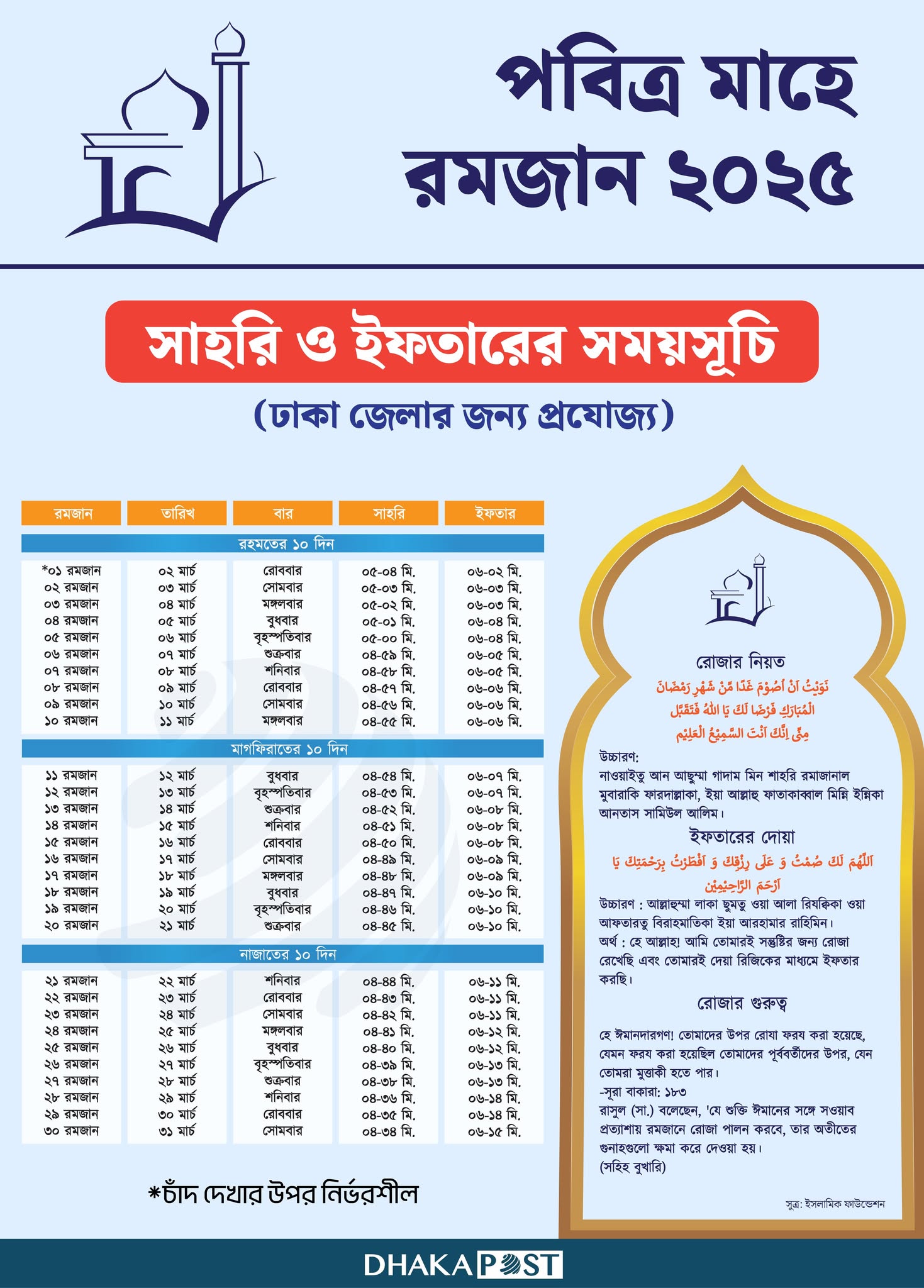Sehri and Iftar Timings 2025 : Essential Schedule for Dhaka
22 February 2025, 11:19 am

The Islamic Foundation has released the official Sehri and Iftar timings for 2025. Depending on the sighting of the moon, the holy month of Ramadan for the year 1446 Hijri is expected to commence on March 1 or 2.
In previous years, a precautionary measure was observed by setting the end time for Sehri (pre-dawn meal) 3 minutes before Subh-e-Sadiq (true dawn) and starting the Fajr prayer time 3 minutes after Subh-e-Sadiq. This year, however, the schedule has been adjusted to align the end of Sehri directly with the beginning of Fajr, eliminating the earlier precautionary buffer. This change is based on Hadiths that do not mention the need for such precautionary intervals.
According to the published schedule, on the first day of Ramadan in Dhaka, expected on March 2, the last time for Sehri is at 5:04 AM, and Iftar (breaking of the fast) is at 6:02 PM.
It's important to note that due to geographical differences, residents in various regions of Bangladesh should adjust their Sehri and Iftar times by adding or subtracting up to 9 minutes from Dhaka's timings. This adjustment ensures accuracy in observance across different locales.
Sehri and Iftar Timings 2025

Significance of Sehri and Iftar in Fasting
Observing Sehri and Iftar at their designated times is crucial in fulfilling the obligations of fasting during Ramadan. Additionally, making the intention (niyyah) to fast is essential. In practice, waking up for Sehri with the purpose of fasting suffices as the intention.
The intention is a matter of the heart and does not require verbal articulation. Therefore, even without a spoken intention, one's fast remains valid. This understanding is supported by various Islamic jurisprudence sources, including Al-Bahrur Ra'iq (2/452), Al-Jawharatun Nayyarah (1/176), Raddul Muhtar (3/339, 341), and Fatawa Hindiyya (1/195).
While a specific Arabic phrasing for the intention has become popular in Bangladesh, it is not found in Hadith or Fiqh literature. However, reciting it is permissible for those who choose to do so.
Duas For Fasting - Sehri Dua with translation
"نَوَيْتُ اَنْ اُصُوْمَ غَدًا مِّنْ شَهْرِ رَمْضَانَ الْمُبَارَكِ فَرْضَا لَكَ يَا اللهُ فَتَقَبَّل مِنِّى اِنَّكَ اَنْتَ السَّمِيْعُ الْعَلِيْم"
Transliteration: "Nawaitu an asuma ghadan min shahri Ramadanal mubarak fardal laka ya Allahu fataqabbal minni innaka antas-sami'ul 'aleem."
Meaning: "O Allah! I intend to fast tomorrow in the blessed month of Ramadan as an obligation for You. Accept it from me; indeed, You are the All-Hearing, All-Knowing."
Dua for Iftar
"بِسْمِ اللهِ اَللَّهُمَّ لَكَ صُمْتُ وَ عَلَى رِزْقِكَ اَفْطَرْتُ"
Transliteration: "Bismillah Allahumma inni laka sumtu wa 'ala rizqika aftartu."
Meaning: "In the name of Allah, O Allah! I have fasted for You, and with Your provision, I break my fast."
This supplication is narrated by Mu'adh ibn Zuhra and recorded in Abu Dawood (Hadith: 2358).
Adhering to these prescribed times and intentions ensures the proper observance of fasting during Ramadan, fostering spiritual growth and discipline.


![Dua Yunus Meaning And Benefits [Details]](https://cdn.dhakapost.com/media/imgAll/BG/2023October/pray-to-allah-20231018164423.jpg)

